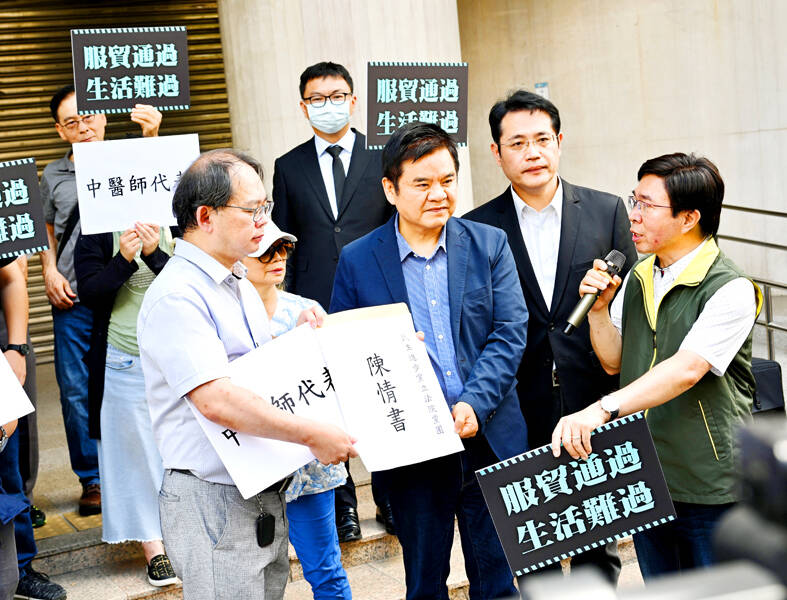Representatives of traditional Chinese and Western pharmaceutical companies and Chinese traditional doctors yesterday held a news conference in front of the Legislative Yuan to express their opposition to restarting the cross-strait service trade agreement.
National Union of Chinese Medical Doctors’ Association secretary-general Chen Po-yuan (陳博淵) said that the agreement would be a “poison” to the industry and is “rotten to the core,” adding that they hoped the Chinese Nationalist Party (KMT) and the Taiwan People’s Party (TPP) could understand the industry’s stance on the matter.
Taiwan-trained traditional Chinese medicine doctors of excellent quality could be drawn to practice in China and vice versa, which could diminish the quality of medical services in Taiwan, he said.

Photo: Lo Pei-de, Taipei Times
If approved, the agreement would diminish the quality of medical services and harm people’s health, he added.
Both the KMT and the TPP presidential candidates, New Taipei City Mayor Hou You-yi (侯友宜) and former Taipei mayor Ko Wen-je (柯文哲) respectively, have proposed restarting talks on the agreement, which failed to be passed after sparking an occupation of the Legislative Yuan by student-led Sunflower movement protesters from 9pm on March 18, 2014, to April 10 at 6pm.
Commenting on the lack of members of political parties at the protest, Chen said he did not know if the caucuses understood what the agreement’s impact on the traditional medicine sector would be.
Traditional medicine pharmaceutical sector representative Hsiao Hung-chih (蕭宏誌) said the pact, if approved, would significantly affect Taiwan’s traditional Chinese medicine supply chain, and eat into an already withering market and number of employees in the industry.
Representatives of the pharmaceutical sector manufacturing Western medicine also said their industry would be greatly affected, as low-priced Chinese products would present intense competition and Chinese-funded companies would drain Taiwan of its talent and technologies.
Industry representatives said that low-priced, low-quality pharmaceutical goods manufactured by Chinese companies — but bearing the “made in Taiwan” hallmark — would significantly damage Taiwan’s standing in the pharmaceutical industry.
Democratic Progressive Party Legislator Chuang Jui-hsiung (莊瑞雄) said that his party has heard the voice of the people and “would not allow” the agreement to be approved.
Democratic Progressive Party Legislator Chiang Yung-chang (江永昌) said the party stands with the industry, as China is already the primary source of traditional Chinese medicine reagents and materials.

The Ministry of Economic Affairs has fined Taobao NT$1.2 million (US$36,912) for advertisements that exceed its approved business scope, requiring the Chinese e-commerce platform to make corrections in the first half of this year or its license may be revoked. Lawmakers have called for stricter enforcement of Chinese e-commerce platforms and measures to prevent China from laundering its goods through Taiwan in response to US President Donald Trump’s heavy tariffs on China. The Legislative Yuan’s Finance Committee met today to discuss policies to prevent China from dumping goods in Taiwan, inviting government agencies to report. Democratic Progressive Party Legislator Kuo Kuo-wen (郭國文) said

The Ministry of Economic Affairs has fined Taobao NT$1.2 million (US$36,900) for advertisements that exceeded its approved business scope and ordered the Chinese e-commerce platform to make corrections in the first half of this year or its license would be revoked. Lawmakers have called for stricter supervision of Chinese e-commerce platforms and more stringent measures to prevent China from laundering its goods through Taiwan as US President Donald Trump’s administration cracks down on origin laundering. The legislature’s Finance Committee yesterday met to discuss policies to prevent China from dumping goods in Taiwan, inviting government agencies to report on the matter. Democratic Progressive Party

Taiwan and its Pacific ally Tuvalu on Tuesday signed two accords aimed at facilitating bilateral cooperation on labor affairs, according to Taiwan’s Ministry of Foreign Affairs (MOFA). The governments inked two agreements in Taipei, witnessed by Foreign Minister Lin Chia-lung (林佳龍) and visiting Deputy Tuvaluan Prime Minister Panapasi Nelesone, MOFA said in a news release. According to MOFA, the agreements will facilitate cooperation on labor issues and allow the two sides to mutually recognize seafarers’ certificates and related training. Taiwan would also continue to collaborate with Tuvalu across various fields to promote economic prosperity as well as the well-being of their

Sung Chien-liang (宋建樑), who led efforts to recall Democratic Progressive Party (DPP) Legislator Lee Kun-cheng (李坤城), was released on bail of NT$80,000 today amid outcry over his decision to wear a Nazi armband to questioning the night before. Sung arrived at the New Taipei District Prosecutors’ Office for questioning in a recall petition forgery case last night wearing a red armband bearing a swastika, carrying a copy of Adolf Hitler’s Mein Kampf and giving a Nazi salute. Sung left the building at 1:15am without the armband and covering the book with his coat. Lee said today that this is a serious